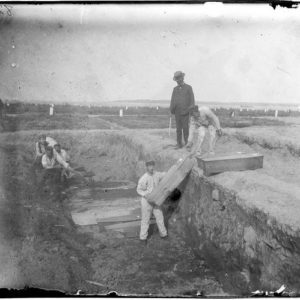Last semester, I fell in love with a cemetery. I had been interested in the processes of death and dying during the height of the AIDS epidemic in New York City and hoped to write one (or more) of my final papers about the topic. A quick series of Google searches led me to Hart Island, a public cemetery where nearly a million unclaimed or indigent people are buried, including many victims of AIDS. I was fascinated. I read everything I could find about Hart Island, watched over a dozen YouTube videos, and even scheduled a visit to the cemetery with a friend.
By the time reading period came along, I had over forty pages of notes about this cemetery. But I had no idea how to write a paper about it. When I met with one of my professors to ask for help, I started to share all of the data I had collected about this site—its history, its design, its present-day controversies. After a few minutes of this, she intervened: “Great, but what’s your question?” I looked at her blankly. “Do you have a question about this site?”

Developing a research question is hardly a new idea. It’s emphasized in the Writing Seminar curriculum, and professors often require us to articulate questions at the early stages of our projects. But once we get buried in the work itself—collecting data, writing, meeting deadlines and assignment requirements—it can be easy to forget why we’re writing at all.
All good research should aim to answer a question. And all enjoyable research should aim to answer a question that matters to you—something that you want to understand about the world, but don’t yet know how. Framing your research as an attempt to answer a burning question can energize and organize your work.
A few weeks ago, after months of research, I still didn’t have an argument for my thesis. Like most seniors, I’ve never written anything as long as a senior thesis. As a result, I’ve had a hard time imagining how I could possibly fill 75 pages with anything, let alone my own original research. Even though I didn’t have an argument, I knew I needed to start putting words on the page. I hoped that if I just started writing, an argument would start to unfold. So I wrote. And I wrote. And I wrote…until I had seventy pages of words, and still no idea of what I was trying to say, just paragraph after paragraph of disconnected data.
When I asked my adviser for help, she guided me back to my original question from our first meeting last spring. It had been almost a year and I had basically forgotten what had initially brought me to my topic. She helped me understand how all of my research was pointing me towards an answer to that original research question. Almost immediately, returning to this question reignited my interest in my topic, clarified what I was trying to accomplish in my thesis, and pushed me towards an original argument.
Equipped with this clarity, I was able to return to my draft and reorganize my data in service of an argument. This revision process is still ongoing, but instead of aimless page-filling, I now have a much clearer idea of where I’m headed and what I’m ultimately trying to say.
In a sense, a research question is an articulation of why we first fell in love with our topic. Maintaining this question throughout the research process can help make our work feel fresh, urgent, and meaningful.
–Rafi Lehmann, Humanities Correspondent

